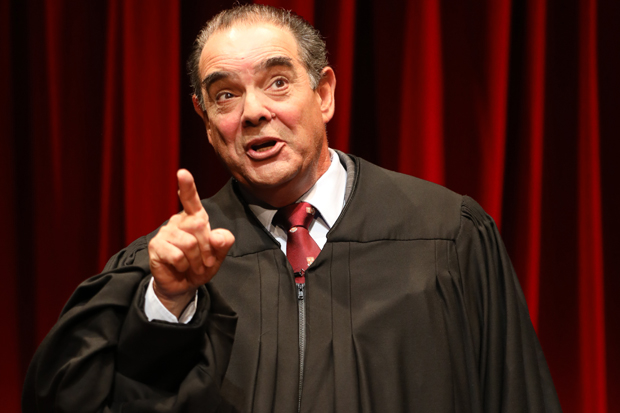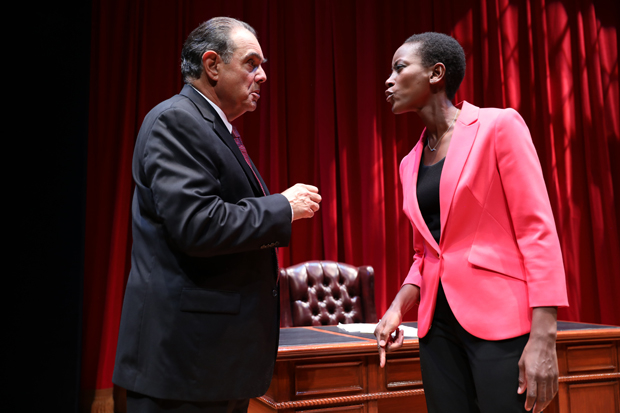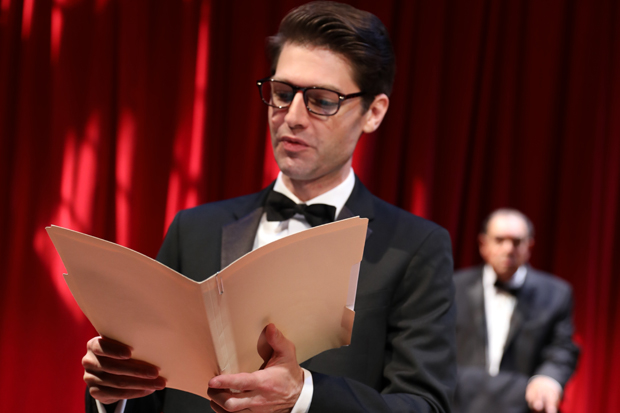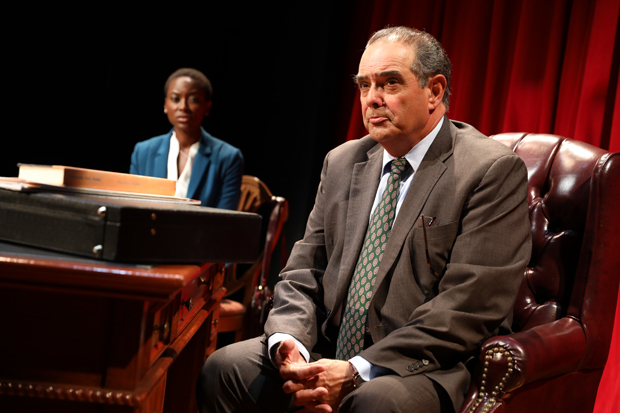The Originalist Resurrects the Ghost of Antonin Scalia
John Strand’s play imagines a friendship between the late Supreme Court Justice and a liberal young clerk.

(© Joan Marcus)
Antonin Scalia enters conducting "Libiamo ne' lieti calici," the famous drinking song from La Traviata, in John Strand's The Originalist, now making its New York debut at 59E59. Judging constitutional law, he tells us, is like performing opera: "The notes are the notes. They are exactly what the composer composed, now and a hundred years from now." This may be true from an aural standpoint, but the stage direction is an entirely different matter (as anyone who has taken a recent trip to an opera house could attest). Yet this fallacious assumption of stasis is essentially the philosophy behind the late Supreme Court justice's much-vaunted (and equally derided) "originalist" jurisprudence. It is also the subject of Strand's thought-provoking (and equally contrived) play.
It takes Scalia (Edward Gero) and puts him in intellectual combat with Cat (Tracy Ifeachor), a liberal black lesbian fresh out of law school. While he thinks the constitution is a "dead" document that must be interpreted strictly according to the intentions of its framers, Cat thinks this approach cannot possibly accommodate an ever-changing nation. Scalia insists that this isn't the problem of Supreme Court justices, whose only concern should be what is written in the constitution. Of course, he might want to tell that to former Chief Justice John Marshall, whose 1803 ruling in Marbury v. Madison established the practice of judicial review, a power not specifically granted to the court in the constitution that has nevertheless consumed most of its energy in the past two centuries.

(© Joan Marcus)
Despite Cat's audacity in confronting Scalia during a public lecture, he decides to take her on as a clerk in order to have a reliable liberal punching bag. He doesn't count on her ability to punch back. They spar on issues ranging from abortion to gun rights to same-sex marriage, which is coincidentally the subject of the upcoming United States v. Windsor case (the play takes place from 2012-2013). Despite their extreme differences of opinion, they develop a bond of mutual respect, making The Originalist feel a lot like a Norman Lear sitcom featuring Scalia as Archie Bunker with a Harvard Law degree.
This results in a certain amount of sitcom acting from Gero and Ifeachor, who commit to the more ludicrous exchanges in Strand's script (like when Scalia asks Cat to draw from a deck of cards as a prompt for discussing various Constitutional amendments) with forced gusto. Ifeachor, in particular, strains to make her talking-point lines sound fully human. Gero fares a little better, arming himself with bulging eyes and sarcastic one-liners that feel eerily reminiscent of the justice, an opera enthusiast whose flare for the dramatic is well-documented. Costume designer Joseph P. Salasovich furthers the resemblance by styling Genro with thin slicked-back hair and ill-fitting suits.

(© Joan Marcus)
Much has changed since this play's 2015 premiere at Arena Stage (when Scalia was still alive), and a third character feels like a prescient harbinger of that: Brad (a breezily smug Brett Mack) is a young Republican law clerk whose mixture of dispossession anxiety and daddy issues perfectly captures the state of right-wing politics today. He has to collaborate with Cat on Scalia's Windsor dissent and thinks that her homosexuality is a conflict of interest. Cynically, he also thinks she could make loads of money as a token black lesbian conservative, provided she was willing to play the part.
Strand's play is foremost about ideas and national trends, so director Molly Smith wisely spotlights the text with an uncluttered and highly focused staging. Most scenes feature just two actors talking. Misha Kachman's set of plush red curtains and hanging chandeliers evokes not only the U.S. Supreme Court, but a low-rent opera house. Sound designer Eric Shimelonis blasts us with opera during the transitions, while lighting designer Colin K. Bills creates dramatic shadows for a scene in which Scalia and Cat pray together in a Catholic basilica.

(© Joan Marcus)
In such moments, Strand wants to show us the value of compromise and how much we can achieve if we begin from a place of respect for our fellow citizens. In its saccharine and affected way, The Originalist achieves that, but it does an even better job of isolating the primeval impulse behind originalism: Scalia carried to his grave an undying faith in the literal application of a centuries-old text, a conviction the devout Catholic shared with fundamentalist Protestants and radical Muslims alike. There's real comfort in the idea that the world can be explained by one text, forever and ever. Reaching for that false comfort is a natural human instinct, but one that must be resisted if the difficult process of self-government is to ever succeed.









